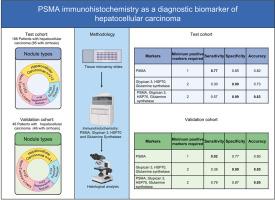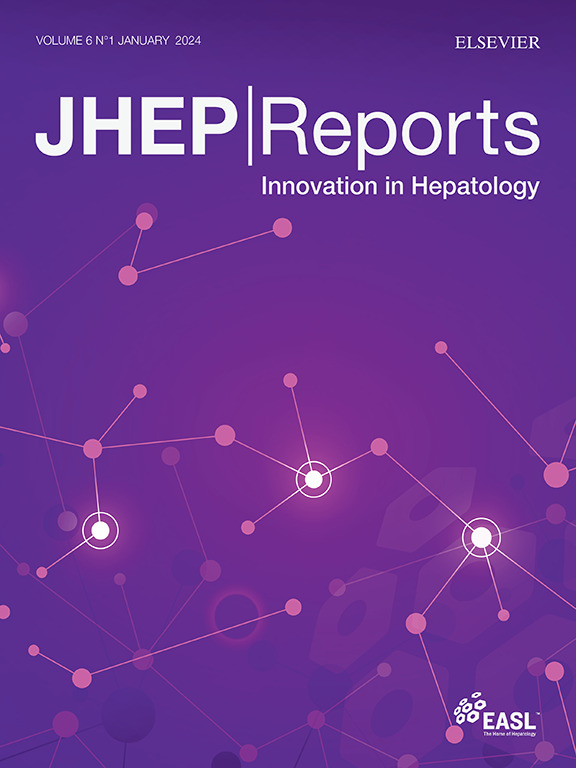PSMA immunohistochemistry as a diagnostic biomarker of hepatocellular carcinoma
IF 7.5
1区 医学
Q1 GASTROENTEROLOGY & HEPATOLOGY
引用次数: 0
Abstract
Background & Aims
A combination of three immunohistological markers (Glypican 3, heat shock protein 70 [HSP70], and glutamine synthetase [GS]) is routinely used to differentiate hepatocellular carcinoma (HCC), but this panel’s sensitivity is suboptimal. Our aim was to assess the diagnostic value of prostate-specific membrane antigen (PSMA) expression for diagnosing HCC in a series of hepatocellular nodules and compare its performance with that of routinely used markers.
Methods
We included 320 hepatocellular nodules from 188 patients in a test cohort and 87 hepatocellular nodules from 48 patients in an external validation cohort distributed as follows: regenerative nodules (RN, n = 39+22), low-grade dysplastic nodules (LGDN, n = 38+16), high-grade dysplastic nodules (HGDN, n = 30+8), early HCC (≤2-cm nodules) (n = 107+24), HCC (n = 106+17), and corresponding non-tumour livers (NTL, n = 152+37). PSMA, HSP70, Glypican 3, and GS expression was assessed by immunohistochemistry on tissue microarrays. For each marker or combination of markers, sensitivity, specificity, and accuracy were calculated.
Results
In the test cohort, PSMA was expressed in 83% of HCC (n = 88/106), 77% of early HCC (n = 82/107), 27% of HGDN (n = 8/30), 21% of LGDN (n = 8/38), 18% of RN (n = 7/39), and 3% of NTL (n = 5/152). In the validation cohort, the sensitivity and specificity of PSMA for HCC diagnosis were 0.95 and 0.77, respectively, and its accuracy was 0.83. The sensitivity and the specificity of the Glypican 3–HSP70–GS (≥2 positive markers) combination for HCC diagnosis were 0.41 and 0.99, respectively, and its accuracy was 0.80. Adding PSMA to this combination increased the sensitivity and accuracy to 0.85 and 0.86, respectively.
Conclusions
PSMA alone has shown good performance in diagnosing HCC, outperforming the combination of the three routinely used markers. When sufficient material is available, adding Glypican 3, HSP70, and GS to PSMA could be recommended.
Impact and implications
Differentiating hepatocellular nodules, particularly high-grade dysplastic nodules and hepatocellular carcinoma (HCC), based on histologic criteria remains challenging. In this study, we assess the diagnostic value of a new immunohistochemical marker, prostate-specific membrane antigen (PSMA), for diagnosing HCC in two independent series of hepatocellular nodules and compare its performance with that of routinely used markers (Glypican 3, heat shock protein 70 [HSP70], and glutamine synthetase [GS]). PSMA alone has demonstrated good performance in diagnosing HCC, superior to the combination of the three routinely used markers, and could be useful in practice for differentiating difficult-to-classify hepatocellular nodules. When the material is sparse, using PSMA alone could be recommended, whereas when sufficient material is available, adding PSMA to Glypican 3, HSP70, and GS may be advised, as this combination has shown the best performance for HCC diagnosis.

PSMA免疫组化作为肝细胞癌的诊断生物标志物
背景:三种免疫组织学标志物(Glypican 3、热休克蛋白70 [HSP70]和谷氨酰胺合成酶[GS])的AimsA联合检测通常用于鉴别肝细胞癌(HCC),但该检测组的敏感性不够理想。我们的目的是评估前列腺特异性膜抗原(PSMA)表达对一系列肝细胞结节中HCC的诊断价值,并将其与常规标志物的表现进行比较。方法我们纳入了188例患者的320个肝细胞结节,以及48例患者的87个肝细胞结节,其分布如下:再生性结节(RN, n = 39+22)、低级别发育不良结节(LGDN, n = 38+16)、高级别发育不良结节(HGDN, n = 30+8)、早期HCC(≤2 cm结节)(n = 107+24)、HCC (n = 106+17)和相应的非肿瘤肝脏(NTL, n = 152+37)。采用组织芯片免疫组化技术检测PSMA、HSP70、Glypican 3和GS的表达。计算每个标记或组合标记的敏感性、特异性和准确性。结果在试验队列中,PSMA在83%的HCC (n = 88/106)、77%的早期HCC (n = 82/107)、27%的HGDN (n = 8/30)、21%的LGDN (n = 8/38)、18%的RN (n = 7/39)和3%的NTL (n = 5/152)中表达。在验证队列中,PSMA诊断HCC的敏感性和特异性分别为0.95和0.77,准确性为0.83。Glypican 3-HSP70-GS(≥2个阳性标志物)联合诊断HCC的敏感性和特异性分别为0.41和0.99,准确性为0.80。将PSMA添加到该组合中,灵敏度和准确度分别提高到0.85和0.86。结论单用spsma对HCC的诊断效果较好,优于三种常用标志物的联合诊断。当材料充足时,可以推荐在PSMA中添加Glypican 3、HSP70和GS。影响和意义基于组织学标准鉴别肝细胞结节,特别是高级别发育不良结节和肝细胞癌(HCC)仍然具有挑战性。在这项研究中,我们评估了一种新的免疫组织化学标志物前列腺特异性膜抗原(PSMA)在诊断两种独立的肝细胞结节中的HCC中的诊断价值,并将其与常规使用的标志物(Glypican 3、热休克蛋白70 [HSP70]和谷氨酰胺合成酶[GS])的表现进行了比较。单独使用PSMA在诊断HCC方面表现良好,优于常规使用的三种标志物的组合,并且在实际中可用于区分难以分类的肝细胞结节。当材料稀疏时,建议单独使用PSMA,当材料充足时,建议在Glypican 3、HSP70和GS的基础上添加PSMA,因为这种组合在HCC诊断中表现最佳。
本文章由计算机程序翻译,如有差异,请以英文原文为准。
求助全文
约1分钟内获得全文
求助全文
来源期刊

JHEP Reports
GASTROENTEROLOGY & HEPATOLOGY-
CiteScore
12.40
自引率
2.40%
发文量
161
审稿时长
36 days
期刊介绍:
JHEP Reports is an open access journal that is affiliated with the European Association for the Study of the Liver (EASL). It serves as a companion journal to the highly respected Journal of Hepatology.
The primary objective of JHEP Reports is to publish original papers and reviews that contribute to the advancement of knowledge in the field of liver diseases. The journal covers a wide range of topics, including basic, translational, and clinical research. It also focuses on global issues in hepatology, with particular emphasis on areas such as clinical trials, novel diagnostics, precision medicine and therapeutics, cancer research, cellular and molecular studies, artificial intelligence, microbiome research, epidemiology, and cutting-edge technologies.
In summary, JHEP Reports is dedicated to promoting scientific discoveries and innovations in liver diseases through the publication of high-quality research papers and reviews covering various aspects of hepatology.
 求助内容:
求助内容: 应助结果提醒方式:
应助结果提醒方式:


